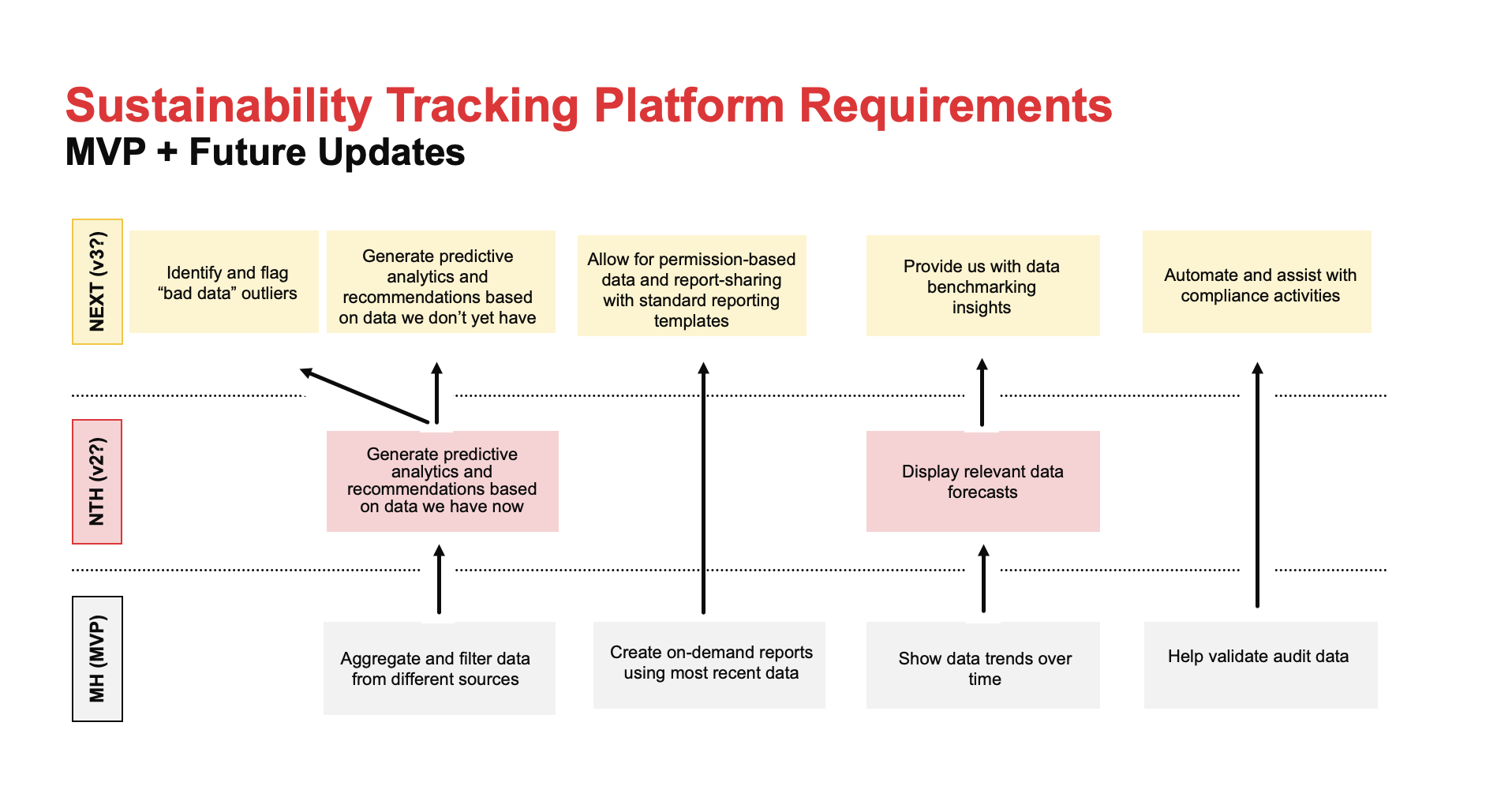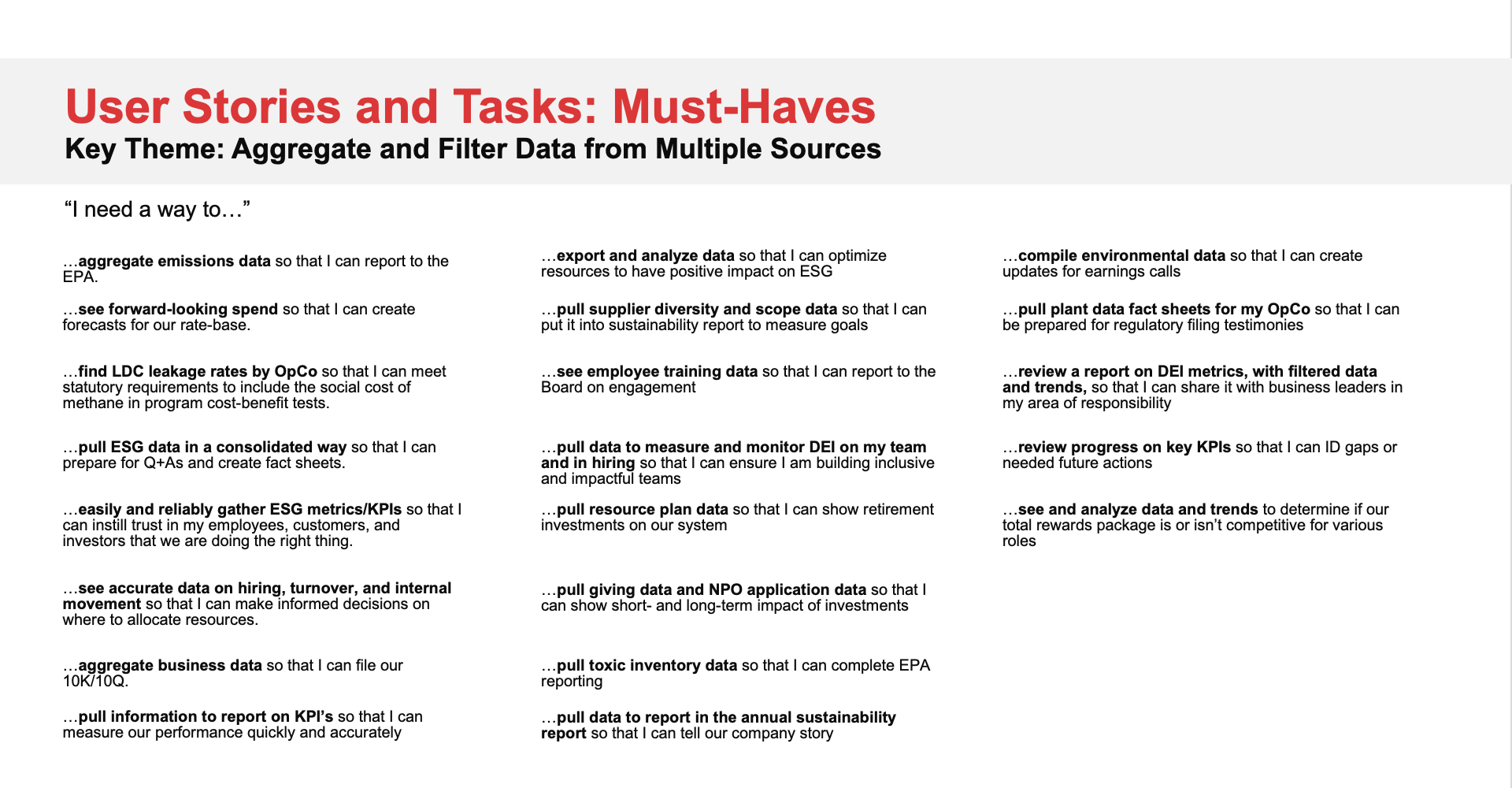
DESIGNING A SUSTAINABILITY TRACKING PLATFORM FOR THE FUTURE
THE CHALLENGE
A lack of standardized data platforms and processes makes it difficult to accurately track and report on metrics critical to identifying progress on critical sustainability measures.
APPROACH + ACTIVITIES
OBJECTIVES
Working with the Director of Energy and Environmental Policy, we identified a project approach organized around the following objectives:
Create champions for a shared strategy and definition of sustainability
Establish ownership of data for people, process and technology measures connected to environmental, social, and governance goals
Outline requirements and parameters for a flexible, future-state sustainability tracking platform
To learn more about the current state of sustainability metric tracking, XCELab conducted interviews with internal stakeholders who were contributing to the current process and those who would likely be the user of the new tracking platform. Armed with those insights and documentation on the process we designed a two-day interactive workshop.
Review and analysis of research conducted by our team related to sustainability data collection, data integrity, and data analysis and sharing at Xcel Energy
DELIVERABLES
OUTCOMES + NEXT STEPS
Identified Initial Platform MVP
• Synthesis of working session activity yielded an initial set of agreed-upon criteria to serve as the foundation of a new sustainability metric tracking platform and process
Multi-day interactive working session with cross-functional team including Xcel Energy data team members, as well as representatives from all areas that contribute to sustainability metric tracking
Session focused on defining data requirements, identifying and prioritizing stakeholder use cases, and determining future data owners
Initial Platform Requirement Themes
Our synthesis of requirements broke potential features of future sustainability data tracking platform into “must-haves”, “nice-to-haves”, and "next” categories, based on the time horizon we (and the client working group) believed best matched each feature.
To showcase both the potential future growth of this platform, we added in a secondary visual to show how each feature might progress from the bottom “MVP” line to a potential v2 or v3 as additional testing and building cycles were completed.
This visual also helped us demonstrate that ideal future states were enabled by investment in a specific set of initial features that would set the stage for a new platform and processes to grow and mature with the organizations data and metric tracking capabilities.
Feature User Stories
As a connection point to the prioritized platform features, we included a themed and raw insight view of the user stories that supported each feature.
Our client sponsor and the teams we worked with on this project could use this document as a way of beginning conversation with internal product teams to guide discussion about building this platform, as well as a reference point with leadership to showcase how requested investment was grounded in a robust understanding of various user types and needs.
Data Owner Documentation
With an effort as large as this, covering a number of teams, data types, and use cases, it was important for the working team to be able to manage next steps in a coordinated way.
The data owner summaries we provided indicated the metrics that feed each of the overall ESG categories and identified a team or person responsible for gathering and tracking metric data as well as who would be accountable should that data not be available or contain errors.
Generated Path-Forward Plan
• With client sponsors, we outlined three work-streams to focus on establishing data strategy and governance for ESG metrics, exploring options for a digital ESG reporting platform, and building the business case for future investment in both governance and new platform
Solidified Connected Approach
• Our project continued to deepen collaborative relationships needed to move an effort of this size and scope forward, especially considering the needed improvements in data sharing and process standardization across the Xcel Energy organization



